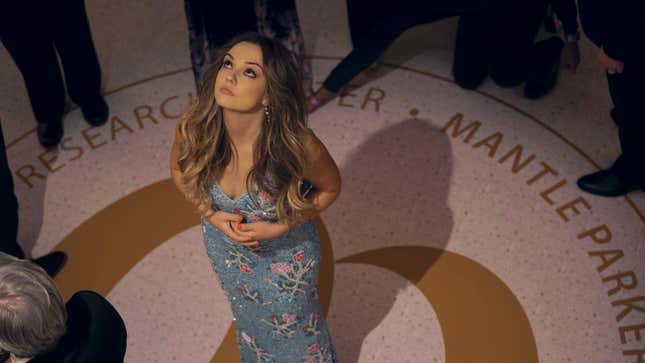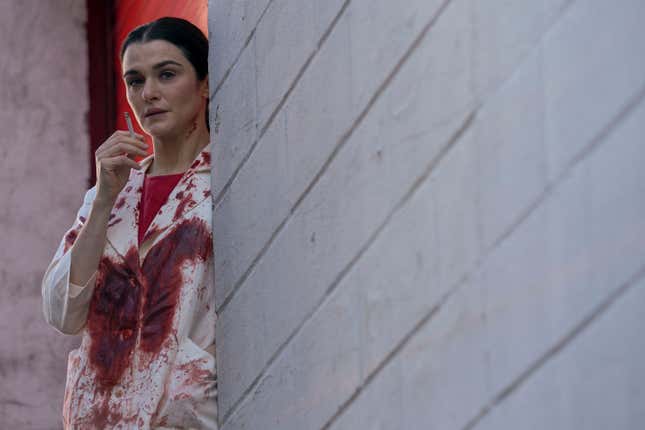‘Dead Ringers’ Skewers the Grim Realties of Gynecological Care

In the premiere episode of Prime Video’s new mini-series Dead Ringers, Rachel Weisz, as twin gynecologists Elliot and Beverly Mantle, goes head(s) to head with Rebecca Parker (Jennifer Ehle), a billionaire drug-company heiress of the Sackler sort. The Mantles have pitched her an idea for a revolutionary birthing center and laboratory as an alternative to hospitals in which giving birth too often results in death. They could change the way people bear children, if only with her investment of $16 million.
Medicine, Parker assures the twins, is her “fucking jam,” but she’s less than compelled by their pitch, leaving one with the impression that the notion of all pregnant people being provided with the dignity of resources and attention…well, isn’t her jam at all. Beverly, the more altruistic of the twins, responds with an affecting diatribe about the “diabolical” medical industrial complex and how it maims the lives of patients and their babies every day: “It’s a system that bullies and scares and terrorizes and humiliates and rushes and ruins women and their bodies,” she says across a pristine table linen in a pretentious Manhattan eatery. Suddenly, Parker’s interest is piqued.
Dead Ringers, which premieres on Friday, is subversive, sometimes shockingly gory, and a needful skewering of the U.S. medical system, the unethically wealthy, and perhaps most of all, the women society lauds as the arbiters of feminism. Among its most ghastly features is the ensemble cast of complex women who hold (and exploit) power throughout. A feminized take on David Cronenberg’s film of the same name, the six-episode series interrogates their internalized misogyny and capitalistic desires as the twisted twins chase their all-consuming dreams: For Beverly, it’s actualizing worldwide bodily autonomy for women, while Elliot seems only to be motivated by experimentation (like illegally growing embryos in a lab).

Meade as Susan
Image: Prime Video
One character’s intentions are slightly more ambiguous: Susan, Parker’s baby-loving fourth wife, who upon introduction seems to be the idealist counterbalance to Parker’s ruthless capitalism. But a more cynical person will swiftly glean she is simply shopping for another wealthy-white-woman busy box to boost her self-esteem and buff her veneer of goodwill. Actor Emily Meade plays her with a certain off-kilter familiarity—like a person you have a perfectly nice conversation with at a cocktail party yet who remains something of an enigma.
“I’m always fascinated by people who seem to have a completely compartmentalized conscious and subconscious,” Meade explained of Susan during a recent Zoom interview with Jezebel. “There’s almost like this facade that they’ve really created for themselves and believe, and then there’s these little moments where the inner person who’s a lot smarter and a lot more manipulative and a lot more aware peeks through in these frightening ways.”
“Susan, of course, is driven by many selfish things; by money, by a desire to immortalize herself in the world by making an impact,” she continued. “I also think that she does believe that she just loves babies and wants to bring them into the world. But I think her intentions are unclear to us as the audience because they’re unclear to her.”
Dead Ringers - Official Trailer | Prime Video
Meade is far more discerning. Her credits are pockmarked by highly-regarded prestige television, like HBO’s Boardwalk Empire, The Leftovers, and most recently, The Deuce, in which she starred as a beleaguered sex-worker-turned-porn-star. But there was at least a two-year period after The Deuce wrapped in 2019 when she readily admits to feeling, as she wrote in a since-deleted Instagram post in 2021, “blacklisted” by the industry. That was, until she landed her role on the almost entirely woman-helmed Dead Ringers.
“I think feeling surrounded by women—and not just women, but incredibly kind, special, intelligent women— created a really safe, warm environment, as much as we were acting out and talking about pretty harsh and ugly things at times,” Meade said. “Rachel Weisz is like, the most warm, compassionate human I’ve ever met, so there was just a warmth and a love and sort of feeling of sisterhood or a coven that for me didn’t particularly make anything seem difficult.”
It’s something of a departure for Meade, whose experiences on sets have more often than not been less than positive, since she began acting at 16 years old. She’d been typecast, it seemed, as hyper-sexualized—and hyper-traumatized—characters. Given previous overexposure, she nearly turned down The Deuce, which also happened to see her character either in various states of undress, under duress, or both. But it was too good of an opportunity. “This is the last time,” she recalled telling herself. Meade wouldn’t learn until production began exactly what her role entailed: in short, more nudity, more sexual abuse, and the kind of tragic end the bible says befits all women who dare to have sex for money.
Then, in 2018, as MeToo allegations roiled Hollywood, Meade’s co-star James Franco was accused of sexual misconduct by five women. (He denied the claims at the time.) As was the case for innumerable men who were alleged of exhibiting similar behavior during that time, HBO and The Deuce’s leadership—namely, creator David Simon—rushed to Franco’s defense.
“Our show and HBO pretty quickly came forward and said we support James and we’re going on with the show, and I just couldn’t really handle feeling spoken for in that way,” Meade said. “I didn’t want to be spoken for in a way that basically, to me, denied the allegations of these women.”
Meade weighed her options. She could issue a statement or tweet her dismay at production’s immediate support for Franco, but those responses seemed inadequate. Ultimately, she settled on leaving the show, which prompted a series of conversations with The Deuce and HBO executives wherein she was asked what she’d require in order to stay. At the time, Meade had never heard of an intimacy coordinator; no one really had. Instead, she described a figure who would have no creative input but whose primary purpose would be to ensure safety for actors in positions like her.
“I said to them, ‘I want there to be somebody on the set of this show—and all HBO shows—that is solely there to facilitate, protect, and to advocate in sex scenes, much like a stunt coordinator when dealing with physical violence,’” Meade recalled. “I thought there should be someone there who didn’t have any motives other than their job.”
“I also said I wanted all the women on the show to have veto power over doing sex scenes with people if they didn’t want to, because a lot of the time we would show up to set and there would be a person there that we had to do a sex scene with that we had never met before,” she added. HBO agreed to Meade’s request and soon hired Alicia Rodis, a performer now credited with pioneering the role of intimacy coordinators on sets, who’s since become a consultant on the network’s productions. The rest, of course, was history. But the move wasn’t without repercussions—notably, criticism from industry peers like Sean Bean, who remarked that intimacy coordinators spoiled the “natural way lovers behave” in sex scenes.
“I knew that I was doing what I needed to do for myself and the women on the show, but it’s definitely been hard since, because I have wondered if it’s affected my career,” Meade confided. “There was a lot of anger and there still is. To me, you know, that just shows ignorance, because it’s a movie set. It’s already not real. If a director or an actor is okay with having a stunt coordinator there, it’s no different to have an intimacy coordinator there. It’s not directing the sex scene. It’s not changing the sex scene. And the sex scene shouldn’t be authentic, because you’re not having sex.”
Regardless, she says she has no regrets: “I think it’s insane that this didn’t already exist and I had to even bring this up in the first place. I think there will always be people that are angry about it. That’s just…I don’t know, that’s the cross that I bear when it shows up.”

Rachel Weisz in “Dead Ringers”
Image: Prime Video
Fortunately, it hasn’t shown up, nor has she personally required an intimacy coordinator as of late, since her role in Dead Ringers doesn’t require it. Even still, Meade can draw easy parallels between The Deuce and Dead Ringers. Both take unflinching looks at an industry that objectifies and makes money off of women, and both pose important questions about what people do and don’t consent to within those industries’ confines, she explained. In one stinging scene in the premiere episode of Dead Ringers, a Black woman dies in the maternity ward of a hospital hours after giving birth of entirely preventable causes. “She was afraid of the place where she’s supposed to feel the most safe,” Beverly laments. It wouldn’t be difficult to imagine Meade’s perception of women’s health and notably, who bankrolls, practices, and legislates it—not to mention who it’s made accessible to—changing in the wake of filming the mini-series. But really, it only contextualized her own unsafe experiences within the medical system, she said.
“I started going to the gynecologist at, I’d say like 15, and I have not had a child yet, but I have had pregnancies and I have had a lot of experiences with gynecology, and they have all been rather negative,” she said. “I’ve been very aware for a long time that it is a painful experience for me to go to the gynecologist, not just because it is physically painful but because it is emotionally. So, getting to be a part of the show really confirmed for me that that’s not something I’m making up and that this is a really under-researched, under-nourished, and you know, capitalistic industry.”
Meade would not have felt safer in the hands of gynecologists like the twins, whose ambition ultimately gives way to the same dehumanization they’ve criticized. And eventually, their actions have grim consequences.
“I think some viewers will be really angry and offended and upset by it and I, you know, personally always love a little controversy,” Meade laughs. It’s not like she’s shied away from controversy before.
